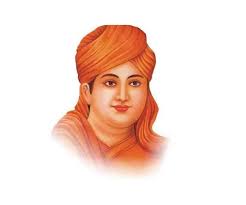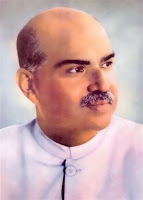CONSTITUENT ASSEMBLY OF INDIA REMEMBERING MAHARISHI DAYANAND SARASWATI
CONSTITUENT ASSEMBLY OF INDIA REMEMBERING MAHARISHI DAYANAND SARASWATI
CONSTITUENT ASSEMBLY OF INDIA DEBATES
(PROCEEDINGS)-VOLUME II
Tuesday, the 21st January, 1947
Mr. R. V. Dhulekar:
Some say that the Constituent Assembly
is not a sovereign body; it is a creation of the British; its very existence
has no meaning and the Constitution drawn up by it has no importance. I cannot
have the audacity to say that they are devoid of sense but I do say that they
are ignorant of Indian history. I need not dwell much on this point. One
thousand years ago, India, for some reason, was decentralised or divided and
failing to withstand the invasions of foreignerscame under their sway. Since
that very time the fire of freedom has been, constantly blazing in the hearts
of the Indian people. It was never extinguished. On the one hand, this fire
appeared in the form of sages. Swami Ramdas, Goswami Tulsidas, Guru Nanak, Swami
Dayanand, Ram Krishna Paramhansa, Vivekanand and Ram Teerath are symbols of
this very fire. On the other hand, statesmen and politicians like Shivaji, Guru
Govind Singh, Rana Pratap Rani of Jhansi, Rani Lakshmi Bai, Raja Ram Mohan Roy,
Lokmanya Tilak, Motilal Nehru and Subhash Chandra Bose were also political
symbols of this very fire. Mahatma Gandhi and Khan Abdul Ghaffar Khan are
saints and politicians both. The Indians owned Babar, Humayun and Akbar to
the extent they indentified themselves with India. During the British
regime in India not a single day has passed that has not seen some torture done
to some Indian in jail for his zeal of freedom. The fight for freedom has been
going on continuously for the--last two hundred years. The sixty years history
of the Congress is a history of sufferings
and sacrifices. Khudiram Bose, Bhagat Singh, Rajguru, Chandrashekhar
Azad and many other patriots in
thousands sacrificed their lives for the cause of India's independence.
CONSTITUENT ASSEMBLY DEBATES (PROCEEDINGS) - VOLUME
IX
Tuesday, the 23rd August 1949
Prof. Yashwant Rai
After thousands of years the Harijans for the first time under the
leadership of Mahatma
Gandhi and thanks to Swami Dayanand felt encouraged to take to
education and they began
to hope that untouchability would be eradicated from society and that
they would enjoy equal rights with others. If we want to achieve these objects
and to form a classless society, we should include a provision to that effect
in the Constitution. Mr. Kamath has said that in article 10 of the Fundamental
Rights it has been stated that there shall be equality of opportunity for all irrespective of caste, creed and colour.
We see that untouchability has been abolished under the clause regarding
untouchability. But this has had no effect in the rural areas. You can find for
yourselves that in the rural areas 85 per cent. of the people, who will have to
follow this Constitution, are uneducated.
CONSTITUENT ASSEMBLY OF INDIA DEBATES
(PROCEEDINGS) -
VOLUME IX
Tuesday, the 13th September 1949
Shri R. V. Dhulekar : Some say
"not yet", but I say that it is a fact. However much you may try to
postpone the day-in your opinion it may be an evil day-in my opinion it is a
fortunate day, it has come. However you may oppose it, it is a decision that the country has taken. Some say that it
is a concession to Hindi language I say "no".
It is a consummation of a historic process". It is the result of an
historical process which has been going
for a long number of years, nay centuries. I may say that Swami Ramdas wrote in
Hindi, Tulsi Das wrote in Hindi, then again the modern Saint, Swami Dayanand wrote in Hindi. He was
a Gujarati but he wrote in Hindi. Why did he write in Hindi? Because Hindi was
the national language of this country.
CONSTITUENT ASSEMBLY DEBATES (PROCEEDINGS) - VOLUME
XI
Monday, the21st November 1949
Shri H.J. Khandekar
Well Sir, even the social, political and religious reformers in the country like Gautama Buddha, Ramanuja, Kabir, Sant Tukaram, Raja Ram Mohan Roy, Swami Dayanand Saraswati, Paramahansa, Mahatma Joti Rao Fulley, Vithal Ramji Shinde, Thakkar Bapa and last but not the least, Mahatma Gandhi, found it very difficult to get rid of this ghost of untouchability. They agitated in the country but they did not succeed. Now, Sir, we have embodied an article No. 17 in this Constitution to remove untouchability and I am sure that untouchability will be removed, but I have seen Act for removing untouchability in the Provinces, the Temple Entry Act and the Removal of disabilities Acts passed by the different Provinces in this country. What is the effect of these laws? Not an inch of untouchability has been removed by these laws and, therefore, if this law of removing untouchability remains in the book of Constitution itself, I do not think that untouchability will be removed. If at all the ghost of untouchability or the stigma of untouchability from India should go the minds of these crores and crores of Hindu folks should be changed and unless their hearts are changed, I do not hope. Sir, that untouchability will be removed. It is now upto the Hindu society not to observe untouchability in any shape or form




Comments
Post a Comment